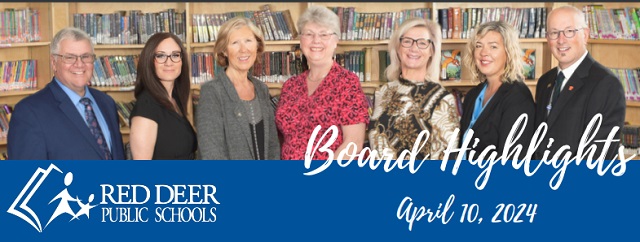Education
Registration starts today – it’s time to register your child for Kindergarten!

Registration starts today for 2019-2020 Pre-Kindergarten and Kindergarten
Time: 8:00 am
Parents/guardians can fill out the application form at any time, and submit it beginning at 8:00 a.m. on Monday, January 14, 2019.
Information on Pre-Kindergarten can be found here while Kindergarten information can be accessed here.
Kindergarten….it is an amazing step for children where they begin the next chapter of learning and growing…
Red Deer Public Schools offers fantastic Kindergarten programming to help ensure that kids have a great start to the next 13 years of school and to make sure kids come to school ready to learn.
Kindergarten also marks a big decision for parents, and some parents may experience mixed emotions, but in Red Deer Public Schools, Kindergarten is a happy and safe environment where children can thrive.
Registration for Kindergarten begins January 14th and parents are encouraged to register early online or in person at any elementary school.
Red Deer Public Schools offers full day and half day programs in English, French and Spanish.
“Our programs focus on the whole child with a strong emphasis on literacy and numeracy development,” said Susan Parkins, Early Learning Coordinator with Red Deer Public Schools. “The children learn independence skills, how to get along with one another and they get to explore their own way to learn. We have wonderful teachers. We love children, we love learning and we love diversity.”
Walking into a Kindergarten classroom, kids can be seen playing and discovering new things. They are playing with purpose – which is the way children learn best.
“The importance of Kindergarten is to bring these little learners in and teach them to be independent learners,” said Amber Cooke, Kindergarten teacher with Red Deer Public Schools. “Everything we do is hands on and that is how kids learn. They learn through doing and they learn through exploring.”
Alvaro Piña, a parent of a Kindergarten student in Red Deer Public Schools, said a Kindergarten classroom is a positive environment.
“There is lots of energy and willingness to learn. They want to observe and they’re always ready for something new,” he said.
For more information, or to register for Kindergarten, please visit http://www.rdpsd.ab.ca/Kindergarten.php.
Education
Solar eclipse school closures underscore impact of learning loss

From the Fraser Institute
Instead of making every effort to protect instructional time and ensure that schools remain open, students are being sent home for ever more dubious reasons.
Schools are closed out of an “abundance of caution.” No doubt you’ve heard this phrase many times over the last few years. It was commonly used during the pandemic when provincial governments closed schools for months on end—even after it was widely known that COVID-19 posed little risk to most children.
Ontario schools were closed for 135 days during the pandemic, more than any other province. Parents and teachers are still trying to recover from this enormous learning loss. Clearly, this was one situation where an abundance of caution caused more harm than it prevented.
Sadly, it appears that provincial officials and school board administrators haven’t learned from their mistakes. Instead of making every effort to protect instructional time and ensure that schools remain open, students are being sent home for ever more dubious reasons.
For example, school boards across Ontario cancelled classes on April 8, the day of the solar eclipse. Apparently administrators felt there was too great a risk that students might look at the sun during the eclipse and damage their eyes. No doubt more than a few of them glanced at the sun while sitting at home that day. However, there was no need for the school closures to be as total as the eclipse. If they were really that concerned, school officials could have kept students indoors or simply altered the dismissal times.
Initially, the Waterloo Region District School Board (WRDSB) took a common sense approach by stating that schools would remain open and teachers would use the eclipse as a learning opportunity for students. Then, only days before the eclipse, the WRDSB suddenly reversed itself and said their schools would indeed close on April 8, and students would have the opportunity to engage in “asynchronous remote learning” instead.
This decision sent the unfortunate message that WRDSB trustees are incapable of standing up to pressure from people who think that schools must close at the slightest sign of real or presumed danger. As for the notion that remote learning was an adequate substitute, our experience during the pandemic showed that for most parents and students, remote learning was thin gruel indeed.
As a further sign of how far paranoia has crept into the education system, some teacher unions demanded they too should be able to work from home during the eclipse. For example, Jeff Sorensen, president of the Hamilton local teacher union, said, “If it’s not safe for children [to be at school], then it’s not safe for adults.”
The union representing Toronto’s Catholic teachers made a similar request. In a memo to its members, local union president Deborah Karam said the union was “intensifying our efforts” to ensure that teachers be allowed to complete their professional development activities at home that day. Surprisingly, no union leader has yet explained why teachers would be less likely to look at the sun while at home than at school.
Of course, school boards must focus on education while also looking out for the wellbeing of students. But there’s more to student wellbeing than simply shielding them from all perceived risks. Extended school closures cause considerable harm to students because they lead to significant learning loss.
By normalizing the practise of closing schools at the slightest sign of danger, real or perceived, we risk raising a generation of young people who lack the ability to do a proper risk assessment. Life itself comes with risk and if we all took the same approach to driving a car that school boards take to school closures, would never set foot in a vehicle again.
Ontario students had a once-in-a-lifetime opportunity to experience a solar eclipse in an educational environment, guided by their teachers. While some parents no doubt taught their children about the eclipse, many others had to be at work.
By closing schools out of an “abundance of caution,” school boards sent the message that school is not a place where unique educational events can be experienced together. Students should be in school during events such as the eclipse, not sitting at home.
If we’re going to exercise an abundance of caution, let’s be a lot more cautious about the risks of closing schools at the drop of a hat.
Author:
Education
Red Deer Public Schools facing million dollar deficit due to inflation and carbon tax

Draft Three Year Education Plan
While the full Division Three-Year Education Plan will be presented to the Board next month, in order to facilitate strategic planning at both the school and Division levels, the Board was presented with the
proposed Strategies and Performance Measures that will set the strategic direction for Red Deer Public Schools in the coming years.
The highest priority for the Division is the success of every student. For the upcoming school year we have organized our strategic work around the following Alberta Education Assurance Domains:
- Student Growth & Achievement
- Teaching and Leading
- Learning Supports
- Governance
The fifth Alberta Education Assurance Domain, Local and Societal Context, encompasses all of the
aforementioned areas. Ten proposed strategies, which will be used to guide Red Deer Public‘s work, as well as 14 proposed performance measures, were also presented. PLAN
Budget Review and Schedule
Red Deer Public Schools is in the process of reviewing its budget for the 2024/2025 school year.
The Division’s budget totals $131 million. With a current projected deficit of $1 million, the state of the Division’s reserves will be about $2.8 million as of Aug. 31, 2024 year end.
Projected student enrolment is also similar for the 2024/2025 school year at about 10,800 FTE students. One challenge this year is that there has not been additional funding provided for inflationary cost increases such as benefit costs, carbon tax, supplies and materials and utilities.
The Board is expected to approve the 2024/2025 budget on May 8, with submission to Alberta Education on May 31. BUDGET
Field Studies Approved
The Board of Trustees approved two Field Studies for students at Hunting Hills High School and Gateway Christian School.
Hunting Hills students enroled in the Chinese Language and Culture courses will travel to China in April 2025. Students will be immersed in the Chinese language and learn to appreciate Chinese culture.

As well, in April 2025, students part of the Co-Impact Team from Gateway Christian School will travel to the Dominican Republic to take part in a number of service activities.
-

 Housing1 day ago
Housing1 day agoTrudeau admits immigration too much for Canada to ‘absorb’ but keeps target at record high
-

 Censorship Industrial Complex1 day ago
Censorship Industrial Complex1 day agoTrudeau’s new online censorship law – Problems with Bill C-63 / the Online Arms Law
-

 conflict2 days ago
conflict2 days agoWestern leadership’s detachment from reality is causing terror and death across the globe
-

 Business1 day ago
Business1 day agoDecarbonization deal opens new chapter in Alberta-Japan relationship
-

 2024 City Councilor By-Election2 days ago
2024 City Councilor By-Election2 days agoGet to know your candidates for city council: Chad Krahn
-

 2024 City Councilor By-Election2 days ago
2024 City Councilor By-Election2 days agoGet to know your candidates for city council: Linda Cullen-Saik
-

 Energy2 days ago
Energy2 days agoNew documentary exposing climate alarmism is the latest victim of Big Tech censorship
-

 Censorship Industrial Complex2 days ago
Censorship Industrial Complex2 days agoNPR senior editor admits extreme bias in Russia collusion, Hunter Biden laptop, COVID coverage







